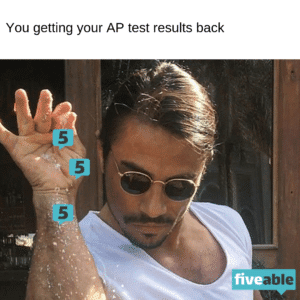How to Self-Study for AP Euro: The Basics
5 min read•july 11, 2024
AP European History 🇪🇺
335 resourcesSee Units
Are you interested in taking the AP European History Exam, but your school doesn't offer the course? Or maybe the course doesn't fit your schedule? Regardless of the reason, a viable solution to preparing for the course would be to self-study!
You may think that a generally broad and diverse course such as AP Euro would be practically impossible to prepare for and pass on your own, however, it can be done. From my own experience, I self-studied the course during my Junior Year of High School and passed the exam in May with a 5.
You may wonder “How?” one might pass the AP Exam. Doing so, I’ve compiled a list of tips and tricks for preparing your self-studying adventure into AP European History, mixed with a few resources and pointers learned from firsthand-experience. But I digress, here are my tips for self-studying AP Euro!
Ask your teacher to assist your self-studying 👩🏫👨🏫
AP European History is a dense course, with loads of material packed into four units. The course outline as of today consists of four periods, starting from the Renaissance to 21st Century Europe. Within the course, you’ll study events you may have learned in other history courses, but far more in-depth from a European perspective.
Along the way, you may have questions or struggle to understand certain themes and topics. This is when your teacher comes into play. It’s always beneficial to have a teacher guiding your learning in the right direction.
Despite this appearing “contradictory” towards the idea of self-studying, getting the help of your local history teacher can really help you navigate through the dense material covered. Your teacher can also offer resources that could serve beneficial to your studying. From textbooks, prep books, and other outlines they may have, having support is generally beneficial. They might even help grade practice essays!
If you don't have access to a teacher who can help you through self-studying, don't worry! This actually leads us to the next step…
Find Online Resources and Material (Prep Books, etc) 📚🌐
If you don't have access to a teacher, there’s always the internet. Through this, there are countless guides and resources to help you study, alongside several instructors on Youtube (for example) who specialize in teaching AP European History.
I recommend taking a look into instructors such as Tom Richey and Paul Sargent, who have countless Youtube Videos up on their channels (which are linked below) that specify in specific units and subjects covered from AP Euro. On top of that, physical copies of study guides are printable. I also highly recommend Albert.io’s “The Ultimate Student’s Guide to AP European History”, which covers not only course material, but test-taking strategies.
Don’t forget about Quizlet too!! Quizlet also offers countless terminology sets that can brush up your understanding of European concepts and isms presented throughout AP Euro.
Lastly, It’s important to accommodate your resources with a main textbook and prep book, one that compliments the guides. From my own experience, I believe that Jackson Spielvogel’s Western Civilization (Since the 1300s) is perfect for tackling AP Euro themes and units. Alongside it, The Princeton Review prep book on AP European History offers up to 5 practice tests and a solid course review section for AP Students. The textbook’s thorough yet understandable text makes studying not only fun but impactful.
Don’t forget that Fiveable too offers a wide array of material on AP European History, with review videos and live streams that emphasize certain topics covered in AP Euro that can help you maximize your score!
Tom Richey ⚜️
Paul Sargent ⚜️
Albert.io’s “The Ultimate Student’s Guide to AP European History” ⚜️
Know Your Periods!! 1️⃣2️⃣3️⃣4️⃣
Diving into the more content-based tips, It’s absolutely vital to understand the general time frame of each Period in AP Euro.
Period 1: 1450-1648
Period 2: 1648-1815
Period 3: 1815-1914
Period 4: 1914-Present
Understanding the time frame of the periods is crucial throughout the AP Exam. It helps to focus your knowledge when answering a multiple-choice question, for example, allowing you to narrow down what events occurred within the specific time frame.
Plan Your Studying 📖📆

With your resources gathered, and the support necessary for your self-studying, the remainder of the task relies on YOU, the individual. Now the amount of content that AP Euro circumferences may seem daunting, it’ll remain as such until you dive into the curriculum.
I suggest you take as much time as you can to digest the information, therefore coming to the conclusion that you shouldn't cram it all into one sitting. Give yourself time to process all the information, and it may take a day or maybe a week. The crucial part of self-studying is understanding that this is all at your pace. It also means that you are the sole reason you either pass or fail the exam.
That being said, the process that worked for me would be to study a chapter for a few days, and alternate between the textbook material and other online sources, prep books, youtube videos. I came to the consensus that If I understood a topic to a great extent, I could move onwards to the next chapter, regardless of whether or not I took notes for every single section. Maximizing your study time into the most important points is vital for self-studying, and can really maximize your potential on the AP Exams.
If a concept isn't sticking with you as quickly as you wish, don't stress about it. Remember to take breaks in-between studying, for overflowing your brain won't help in the long run.
Additional Tips 🇪🇺
Be sure to have taken practice tests before entering the AP Exam; It’s vital to have experienced the time-crunch of the actual exam and to have practiced nailing the timing for the Multiple Choice, SAQ, LEQ, and DBQ.
During the Document-Based Question (DBQ), be sure to cite your documents and their Purpose, Historical Context, Intended Audience, and the Point of View of the Author.
Remember your standard argumentative essay format; have a thesis, your supporting points, and end it with your conclusions. Remember quality over quantity.
When going into the AP Exam, make sure you’ve slept enough the night prior, and eating enough food to fuel your brain. It’s always better to think on a full stomach. Make sure you bring your pencils, pens, erasers, snacks, and water bottles for the testing room.
Lastly, be confident in what you’re doing!! You spent an entire year preparing for an exam without direct teacher support or a classroom filled with peers. Regardless of how you feel you did, remember to acknowledge how much discipline and determination It takes to accomplish such a task. It generally benefits you in the future, either through college credits, or the ability to work efficiently on your own!
Happy Studying!! ❤️❤️

I hope you found this article helpful in guiding your studies. Do you agree with the content provided in this article? Are there any other resources you think are necessary for preparing for the AP European History Exam? Please, let us know what you think of our tips and tricks!
Until then, happy studying!
Browse Study Guides By Unit
🎨Unit 1 – Renaissance & Exploration
⛪️Unit 2 – Reformation
👑Unit 3 – Absolutism & Constitutionalism
🤔Unit 4 – Scientific, Philosophical, & Political Developments
🥖Unit 5 – Conflict, Crisis, & Reaction in the Late 18th Century
🚂Unit 6 – Industrialization & Its Effects
✊Unit 7 – 19th Century Perspectives & Political Developments
💣Unit 8 – 20th Century Global Conflicts
🥶Unit 9 – Cold War & Contemporary Europe
📚Study Tools
🤔Exam Skills
👉Subject Guides

Fiveable
Resources
© 2025 Fiveable Inc. All rights reserved.